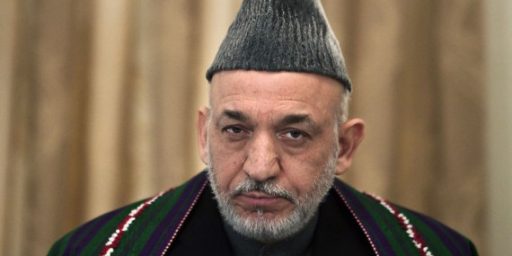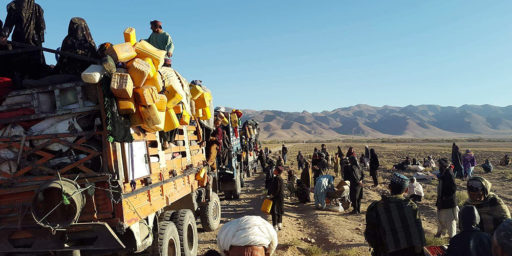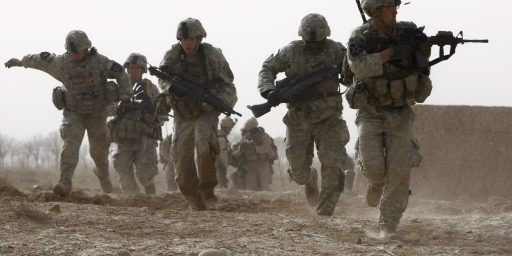Opinions on Afghanistan
Yesterday the New York Times published three op-eds presenting opinions on Afghanistan, one by Robert D. Kaplan, one by Nathaniel C. Fick and Vikram J. Singh, fellows at the Center for a New American Security, and Nader Nadery and Haseeb Humayoon, two Afghans involved with NGO’s.
In his op-ed Mr. Kaplan emphasizes the geo-political importance of the struggle in Afghanistan:
So, here’s my answer: In fact, Afghanistan is more than a manhunt, and it does matter, for reasons that have not been fully fleshed out by policy makers or the military.
Just because you can’t pacify all the ungovernable Islamic spaces on the map doesn’t mean you can’t fix the one or two that are the most important, that have strategic weight over wide regions. For Afghanistan looms larger than it appears.
Strategically, culturally and historically speaking, Afghanistan and Pakistan are inseparable. In the 16th and 17th centuries, both countries, along with northern India, were united under the Mughal Empire. Today Pakistan, with 165 million people, is a nuclearized Yugoslavia in the making, and threatens to be torn apart by the Taliban rebellion in its North-West Frontier Province (and, possibly, by the growing Baluchi and Sindhi separatist movements in its southern half).
He goes on to note the perils that a destabilized Pakistan would pose for India.
Messrs. Fick and Singh advise that, in order to prosecute a counter-insurgency strategy in Afghanistan successfully, we must bolster the Afghan government:
First, the Afghan government must confront corruption in its own ranks. Tribal elders in Ghazni told us that they are “slapped on one cheek by the Taliban, and on the other cheek by the government.” They talked of extortion by the police, dysfunctional courts and rampant bribery in government offices. The average Afghan spends one-fifth of his income on bribes. It’s no surprise so many actively or passively support the Taliban.
To fight corruption, President Hamid Karzai should immediately do three things: fire those seen as the most corrupt cabinet ministers, provincial governors and district governors; arrest and prosecute the most notorious warlords from the civil war in the 1990s, who committed unspeakable atrocities but are living openly in Kabul or the provinces; and break the relationship between the government and the country’s largest industry, the poppy trade.
The coalition can assist in these reforms by “embedding” Western civilian experts in law, government and business management at every level of the Afghan government. This can improve performance and transparency.
I don’t think that Messrs. Fick and Singh ever quite make the case that placing Western civilian experts at every level of the Afghan government will increase its perceived legitimacy or popular support. Indeed, IMO this would be far more likely to undermine its support. Compare Pat Lang’s recent comments:
Afghanistan is a country dominated by tribal loyalties and structures. No matter what the State Department or his political scientist advisers may tell him, those loyalties and lifeways are not going to change much any time soon. The US government is rotten with the political science inspired notion that societies evolve and “progress” in the direction of the creation of geographically logical centralized states. This is merely a theory. It was created to provide a satisfactory (to some)explanation of European history.
The Afghan government of today is merely one of the many “players” in the complex socio-political situation in Afghanistan. If the United States backs the Karzai government with the idea of creating a highly centralized state in Afghanistan, then it is going down the road to re-creating the same social chaos that led to several years of ferocious tribal and factional revolt in Iraq.
Messrs. Nader Nadery and Haseeb Humayoon warn against increasing dissatisfaction with the NATO presence in the country:
The growing disillusionment caused by civilian casualties is also driving old friends away from NATO and American forces. In an interview some months ago, a man who worked alongside American forces in 2001 in Urozgan Province to protect Hamid Karzai, now the Afghan president, posed a staggering question: “You speak English, and interact with foreigners, so can you swear by the Almighty and tell me if the foreigners are on the side of the Taliban, or of the Afghan people?”
He was hardly the exception: many average Afghans find it hard to believe that America, with its tremendous military power, is having so much trouble defeating tattered bands of Taliban warriors and don’t understand why it can’t avoid continuous civilian casualties.
To Afghans, suspicion about the intentions of foreign forces comes easy: we have suffered through two occupations in the last three decades, first by the former Soviet Union in the 1980s and then by Pakistan — indirectly through the Taliban — in the 1990s. Every military operation that kills civilians leads to more conspiracy theories that the Americans and their Western allies want to maintain chaos so they can maintain a military presence in the region.
Some pundits and analysts may have you believe that we Afghans are inherently allergic to the West and its values. That is not true. We craved American and United Nations involvement in Afghanistan long before 9/11. When United States troops finally came to our liberation in late 2001, in city after city they faced cheering people dancing in the streets out of joy. That seems a very long time ago now.
Of course, the rising mistrust of NATO and American forces is not just about civilian casualties. Afghans are frustrated by the failure of our government and its foreign allies to improve security, clamp down on corruption and provide food and jobs.
This morning in the Times of London Britain’s most senior military commander in Afghanistan is trying to lower expectations:
Britain’s most senior military commander in Afghanistan has warned that the war against the Taliban cannot be won. Brigadier Mark Carleton-Smith said the British public should not expect a “decisive military victory” but should be prepared for a possible deal with the Taliban.
His assessment followed the leaking of a memo from a French diplomat who claimed that Sir Sherard Cowper-Coles, the British ambassador in Kabul, had told him the current strategy was “doomed to fail”.
Carleton-Smith, commander of 16 Air Assault Brigade, which has just completed its second tour of Afghanistan, said it was necessary to “lower our expectations”. He said: “We’re not going to win this war. It’s about reducing it to a manageable level of insurgency that’s not a strategic threat and can be managed by the Afghan army.”
The brigadier added: “We may well leave with there still being a low but steady ebb of rural insurgency . . . I don’t think we should expect that when we go there won’t be roaming bands of armed men in this part of the world. That would be unrealistic and probably incredible.”
He continues by stating that NATO forces have “taken the sting out of the Taliban for 2008”.
Unfortunately, they’ll still be in the wild, rugged, mostly ungoverned areas of Afghanistan and Pakistan in 2009 and 2010 whereas NATO forces may or may not be.






I liked this article by Singh and Fick better.
http://smallwarsjournal.com/blog/2008/10/surging-statecraft-to-save-afg/
Any approach needs to look at the total regional picture IMO. We also need to decide if we are better off with or without NATO. Finally, we need to make the decision if we want to or can afford to be there for more than 10 years. Reading the anthropologists impressions of Afghanistan, it is a cultural morass.
Steve
One would think Afghanistan’s role in the global supply of opium and heroin would also be worth some attention and effort to control…
FYI, Nathaniel Fick was the platoon commander in Generation Kill, and his own book about his experiences in Iraq is titled One Bullet Away. I recommend both.